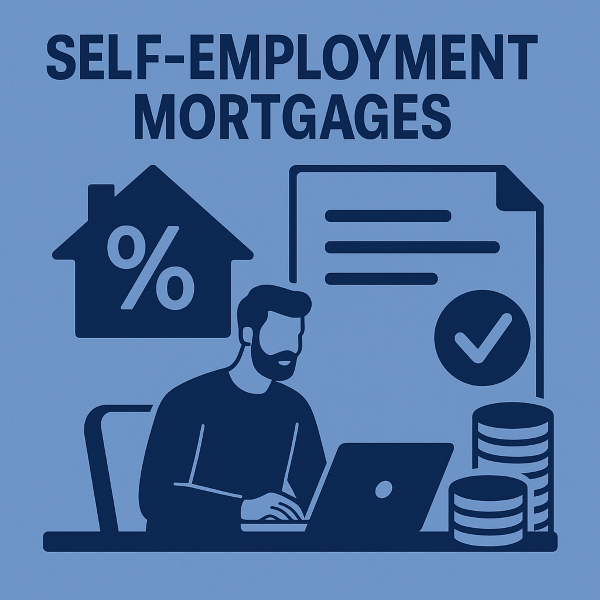Self-Employment Mortgages: A Practical Guide for UK Borrowers | Getting a mortgage when you are self-employed can feel more challenging, especially when your income fluctuates or is paid in non-traditional ways. The good news is that lenders across the UK increasingly understand how self-employed professionals work, and many offer specialist solutions designed for contractors, freelancers, sole traders and limited company directors.
At Connect, we help self-employed applicants secure competitive mortgages by presenting their income clearly, accurately and in line with each lender’s criteria. Whether you’ve been trading for years or have only recently gone self-employed, the right mortgage is within reach.
Who Counts as Self-Employed for Mortgage Purposes?
Lenders usually treat you as self-employed if more than 20 to 25 per cent of your income comes from:
-
Sole trading
-
Freelancing or contracting
-
CIS contracting
-
Partnerships
-
Owning a limited company
-
Dividends or director salary
-
Consultancy income
Each structure affects how lenders assess affordability, so presenting your accounts correctly is essential.
What Documents Do Self-Employed Borrowers Need?
Most lenders request:
-
SA302s or tax calculations (usually 2 years)
-
Tax year overviews
-
Full company accounts if you are a director
-
Business bank statements
-
Proof of upcoming contracts (contractors)
-
Accountant reference, if required
Some specialist lenders can work with one year of accounts, and certain contractor-friendly banks assess affordability based on your day rate, not your accounts.
How Do Lenders Assess Income for Self-Employed Applicants?
Each self-employed structure is evaluated differently:
Sole Traders & Partnerships
Lenders use your net profit as the primary income figure.
Limited Company Directors
Lenders often assess a combination of:
-
Salary
-
Dividends
-
Retained profit (with certain lenders)
This is where working with an adviser can significantly improve your chances.
Contractors
You may be assessed on:
-
Your current contract
-
Your day rate multiplied by 46–48 weeks
-
Your industry experience
This approach can increase your borrowing power compared with using accounts alone.
How to Improve Your Mortgage Chances as a Self-Employed Borrower
| Action | Why It Helps |
|---|---|
| Keep your accounts up to date | Clean, accurate accounts prepared by a qualified accountant demonstrate financial stability and make income verification easier for lenders. |
| Reduce unnecessary business expenses. | Lower deductible expenses can increase your net profit, thereby improving your borrowing capacity under most lenders’ affordability assessments. |
| Avoid significant recent changes in business structure. | Switching structures, such as moving from sole trader to limited company, can complicate lender assessments and may require additional trading history. |
| Maintain a strong credit profile. | A solid credit score gives lenders confidence in your ability to manage financial commitments, which is especially important if your income fluctuates. |
| Work with a broker experienced in complex income. | A specialist adviser can present your accounts clearly, match your income type to the right lenders, and improve your chances of approval. |
Why Self-Employed Mortgages Are Not More Difficult – Just More Detailed
Lenders are not trying to make the process harder; they simply need to verify that your income is reliable. With the right preparation and professional guidance, the process is straightforward. Many lenders actively seek self-employed clients and offer competitive deals tailored for varying income patterns.
How Connect Helps Self-Employed Borrowers
Connect specialises in structuring complex income cases and matching them with the right lenders. We support:
-
First-time buyers
-
Contractors across all industries
-
CIS workers
-
Sole traders and partnerships
-
Limited company directors
-
Newly self-employed borrowers
We also assist with remortgages, buy-to-let applications and portfolio financing.
To explore additional routes, you can learn more about our specialist mortgage solutions, complex income support, and contractor mortgage guidance through our internal resources.
Thank you for reading our publication “Self-Employment Mortgages | The Guide to Mortgage Success.” Stay “Connect“-ed for more updates soon!
FAQs | Self-Employment Mortgage
| Question | Answer |
|---|---|
| Can I get a mortgage with only one year of self-employed accounts? | Yes, some specialist lenders accept one year of accounts, particularly for contractors or experienced professionals. Evidence of upcoming work or strong trading performance helps strengthen the case. |
| Do lenders treat contractors differently from sole traders? | Often yes. Contractors may be assessed based on their day rate multiplied over a set number of weeks, which can increase borrowing power compared with using net profit alone. |
| How do lenders verify my income as a limited company director? | Most assess a combination of salary, dividends, and sometimes retained profit. Providing full accounts prepared by a qualified accountant is essential. |
| Will fluctuating income affect my mortgage application? | Not necessarily. Lenders expect variations in self-employed income and focus on overall stability and long-term earning potential rather than monthly changes. |
| Can I get a mortgage if I recently became self-employed? | It’s possible, but more complex. Some lenders require two years of accounts, while others may consider applicants with strong industry experience, contracts or CIS statements. |
| Does being self-employed mean higher interest rates? | No, not automatically. Rates depend on your credit profile, deposit size and overall affordability, not simply your employment status. |
| What documents will I need for a self-employment mortgage? | Typically, SA302s, tax year overviews, business bank statements, company accounts (if applicable) and proof of current or future contracts. Requirements vary by lender. |
| Is it harder for self-employed borrowers to remortgage? | It can be, but many lenders are flexible. Accurate accounts and a clear explanation of income patterns can help secure favourable remortgage options. |

